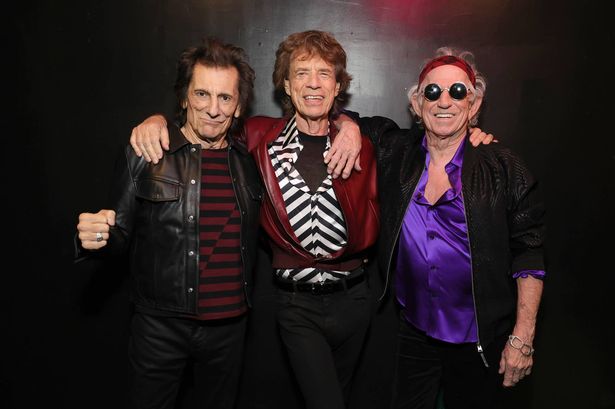Many fans have been shocked to discover the dark past to one of their favourite songs
Music is a universal language, but despite billions listening to their favourite tunes each day, many do not know the hidden stories behind them — and some are darker than others.
The Rolling Stones have amassed a legion of fans over several decades and are slated to tour next year, led by octogenarians Mick Jagger and Keith Richards, and the sprightly Ronnie Wood, 78.
One of the more obvious testaments to the band’s enormous talents is their modern-day relevance and popularity, becoming a British cultural staple and even clocking close to 30million monthly listeners on Spotify 61 years after their debut album.
Their 1969 effort, Let It Bleed, is considered by many to feature their best work, though there is ample selection to choose from.
The aforementioned album includes classics such as You Can’t Always Get What You Want, title-track Let It Bleed and its famed opener, Gimme Shelter, amongst others.
And it’s the latter track which has a haunting legacy centred around one of its more prominent attributes — the quite possibly greatest backing vocals of all time performed by Merry Clayton.
Merry’s powerful performance, which springs out from behind the song’s hypnotic groove, delivered largely via the superb guitar work of Keith Richards, captures the sentiment of the band at that time, dark and seemingly full of despair, as she repeats her lines, “Rape, murder, it’s just a shot away, just one shot away”.
So emphatic is Clayton’s howling that, at around the three-minute mark of the song, you can faintly hear Mick Jagger cheer in the recording studio as her vocal cracks from the intense screams.
However, as celebrated as this song is, racking up more than 730million plays on Spotify today and being recognised as one of the Stones’ finest works, it would result in tragedy for 20-year-old Merry Clayton.
In November 1969, weeks before the Let It Bleed release, a very pregnant Clayton received a call, telling in previous interviews how “I’m at home at almost 12 o’clock at night. And I’m hunkered down in my bed with my husband, very pregnant, and we got a call from a dear friend of mine and producer named Jack Nitzsche.
“Jack Nitzsche called and said… ‘Merry, are you busy?’ I said No, I’m in bed. He says, ‘Well, you know, there are some guys in town from England. And they need someone to come and sing a duet with them, but I can’t get anybody to do it. Could you come?’”
She added: “At that point, my husband took the phone out of my hand and got angry: ‘This time of night you’re calling Merry to do a session? You know she’s pregnant!’
“But Nitzsche succeded to bring my husband on his side. In the end, he managed to convince me: ‘Honey, you know, you really should go and do this date.’”
As previously mentioned, the recording session was intense, with Merry forcing every emotion she had into her vocals, but she would later claim it came at a costly price.
Shortly after returning home, she suffered a miscarriage, with many pointing to the session as a leading reason for the loss of her baby due to the emotional stress and intensity of the process.
Merry could not listen to the song, which is so highly commemorated, due to the link it had with her miscarriage and it took time to recover from this anguish.
“That was a dark, dark period for me, but God gave me the strength to overcome it,” she said during an interview in 1986, 17 years after recording the song.
Source: Mirror




Leave a Reply